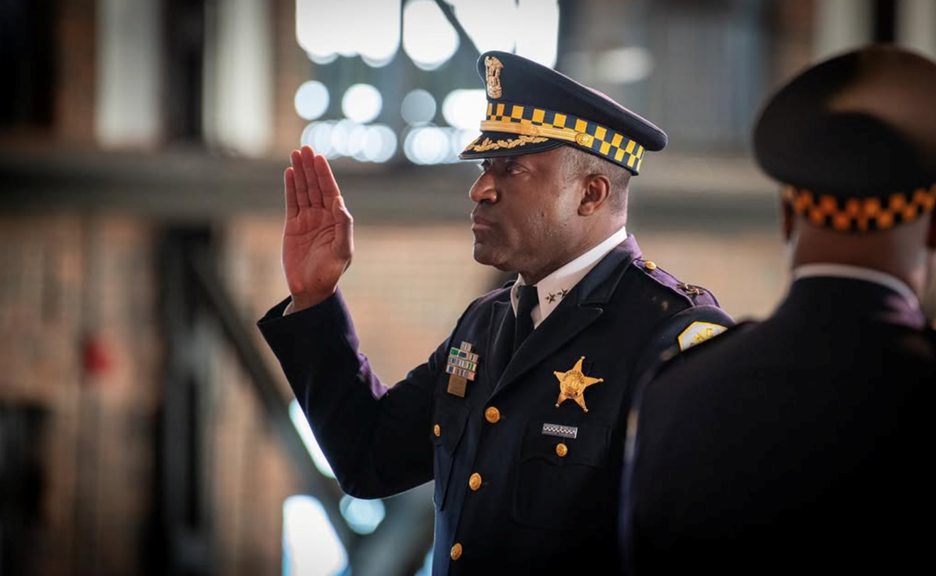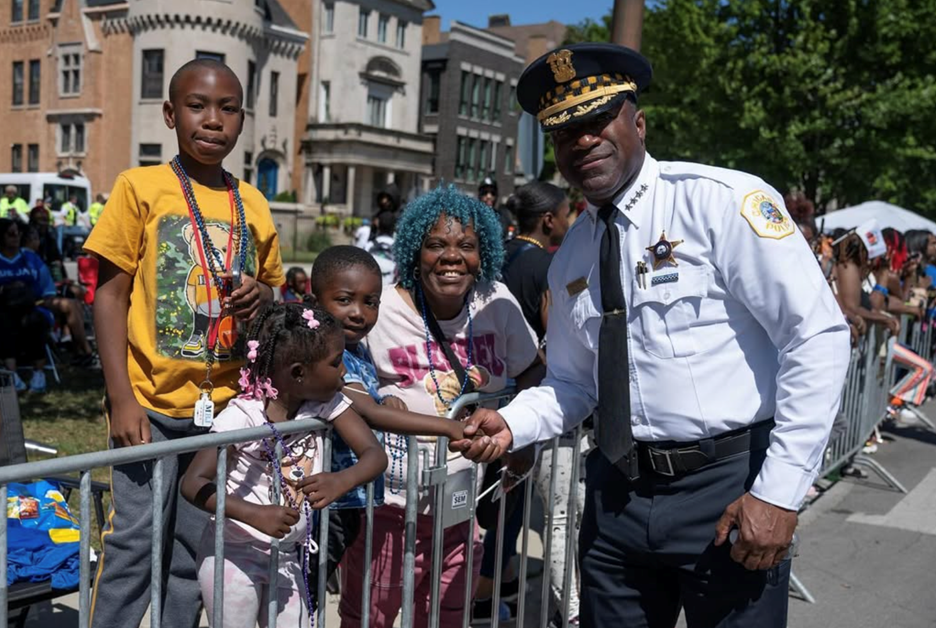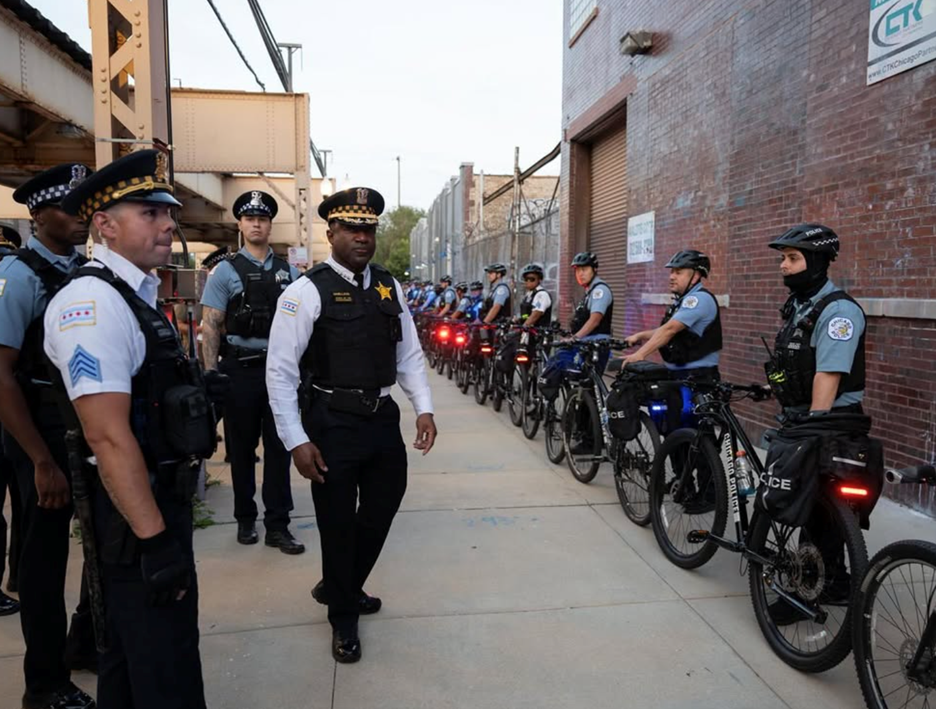|
May 3, 2025 Chicago Superintendent Larry Snelling on his early life, his policing career, and making progress with an agency under a consent decree
PERF members, This week I was in Chicago at a U.S. Conference of Mayors meeting and had an opportunity to catch up with Chicago Police Superintendent Larry Snelling. Superintendent Snelling joined the Chicago Police Department (CPD) in 1992 and was sworn in as the agency’s superintendent in 2023. The agency is under a 700-paragraph consent decree, faces staffing shortages, and was responsible for protecting last year’s Democratic National Convention. CPD recently released a report on the improvements it has made to its homicide investigation practices and announced a new training initiative for all its supervisors. It feels to me like CPD is making significant progress, so I spoke with Superintendent Snelling for today’s Trending column. Chuck Wexler: What was it like growing up in the Englewood neighborhood of Chicago? Superintendent Larry Snelling: I’m the middle son with four brothers. There were five of us, and I was right in the middle. It was a single-parent home, with my mother raising five boys. It was a good community; there were great people there. But it was riddled with gangs, violence, and things of that nature. The gang population wreaked a little havoc on the community, so there were times when you grew up in survival mode. But there were good people there who gave kids guidance, and I had the benefit of some older people in the community who I could talk to. It was more of a family-type environment during that time. Wexler: And a school resource officer had an influence on you, correct? Superintendent Snelling: Yes, Officer Thomas. He was probably about 6’5”, 290 [pounds]—really big guy. He worked in our schools. When you’re in a community like that, you need that guidance or that figure to keep you in line, and that was one of the things that he did. He was never disrespectful, but he’d make sure you went to class. He was there to make sure students were protected, but at the same time, he wanted to make sure you went to class, followed the rules, and got your education. We all looked up to him and were a little afraid of disappointing him. He was a father figure for a lot of kids who didn’t have one.
Snelling was sworn in as superintendent of the Chicago Police Department in September 2023. Source: Instagram Wexler: What did your mother think about you becoming a police officer? Superintendent Snelling: She loved it. She thought it was the greatest thing in the world. For me to become a police officer, my mother saw a level of success that she wanted to see in her sons, and she was very happy. She called all her relatives in Florida to tell them I was becoming a police officer. That was 34 years ago. Wexler: You were an officer and a lieutenant in your home neighborhood of Englewood. Was that difficult? Superintendent Snelling: I went there as a beat officer and became a tactical officer and a member of the gang team. I hadn’t left Englewood for a long period of time before I went back as an officer, so I found myself on the opposite end of some of the people who I went to school with and grew up with. I found myself in situations where they had to be taken into custody or arrested—domestic issues, things of that nature. That was a little challenging, but you understood that you had a job to do, and they needed to understand the same. Going back as a lieutenant was particularly special for me. I asked for that assignment. It was an opportunity to go back to a community where I saw the problems and was still overrun with crime and try to do something about it.
Superintendent Snelling greets residents at the 95th annual Chicago Bud Billiken Parade. Source: Instagram Wexler: You spent time working at the academy. Has that influenced what you want to do as superintendent? Superintendent Snelling: A hundred percent. The time I spent out in the field as a tactical officer and gang officer, grabbing criminals, that is extremely important work and the backbone of the department for the most part. However, we start thinking in a box in those roles because we’re not looking at the development of things. We’re looking at where we are, what we know, and our experiences. But we have a tendency to close off those who are, let’s say, assigned to the academy. Some in those roles have been called a “house mouse” because you work indoors and sometimes that work becomes frowned upon. I’ve been in gang units and done search warrants as a tactical officer, and I’ve never worked as hard as I did in the academy. You’re molding people to go out to the streets and be the best police officers they can be. You’re changing minds and developing them to go out into the community. There are certain things we need our officers to understand. Number one: We want you to go home safe every day. That’s where the training and skill sets come in. Two, we want to make sure you don’t do anything that breaks the law. How do we keep officers from being charged and losing their freedom or being sued? If you are producing well-trained, sound of mind and body, physically and mentally prepared officers and showing them you actually care, you’re developing officers who are not going to bring shame upon your department. At the academy, I taught defensive tactics, use of force, and firearms. I found that for years I was teaching officers how to fight, and how to physically work their way out when things become volatile. But at some point, I realized that I’ve taught them all these fighting skills but never taught them how to avoid getting into the fight. So I started to think about how we put officers in the mindset that if we can avoid this, we will. We are prepared just in case de-escalation or talking someone down doesn’t work. I know I have a tool I could go to as a last resort. But this keeps everyone safe. It keeps the officers safe and the department safe from reputational damage. Wexler: And you’ve implemented our ICAT training for all your officers. Why have you done that? Superintendent Snelling: In 2020, we saw an uptick in violence against officers. We saw people were less cooperative with police officers. And we didn’t want our officers getting caught in the trap where every single thing turns into a fight. We want our officers to utilize time and distance as a tactic to reduce the possibility of a physical altercation. Again, we want our officers ready and prepared to deal with a physical situation if they have to, but we want those officers to use the tools to de-escalate that situation first. ICAT has done a great job of helping our officers take a step back and gather more information before running into a situation. Wexler: The Chicago Police Department has been under a consent decree since 2019. Does that make it more challenging to manage your agency? Superintendent Snelling: When you’re on the outside looking in and not part of a consent decree, you don’t really understand what’s in it and how effective it could be for you. And I’ve been guilty of that myself. So, instead of fighting against it, I’m looking at how we can use it to make us more effective as a department. We have the largest consent decree in the country, with over 700 paragraphs. It’s a lot. However, it’s an opportunity for me to decide if we need more tools for our officers. I’m at all the hearings with the judges, and I’ve taken full responsibility when it comes to this consent decree. It’s not going anywhere, so we need to make the best out of it. And we’ve done upgrades in the detective division mostly based on the PERF report you put out in 2018. We wanted to apply more effective techniques for resolving crimes and increasing clearance rates. We’ve done that. We’ve looked at victim services and our family liaison officers have built trust, which is now helping get more cooperation with the detective division. Wexler: You seem optimistic, and it feels like you have some momentum going in Chicago. Superintendent Snelling: There is momentum going here, and there’s no momentum without buy-in from the officers. Obviously there are times when your officers are going to question what you’re doing. They’re going to hear things and say they don’t like this or that. But it’s up to us as leaders to educate our officers and make sure they’re not falling for rumors. Then we have to make sure to explain what’s best for them, because they’re out there putting their lives on the line every day. Any time there’s a change in policy or something, officers want to know what’s in it for them. I know that may sound selfish, but they have to be. Because when they’re out there putting their lives on the line, they deserve an explanation as to why it will be effective for them. Wexler: I saw you the other day—someone was basically saying don’t do traffic stops, and you were saying, well, there’s a time and a place. Superintendent Snelling: A hundred percent. And what happens is, there are groups that will come up with a narrative around traffic stops and they will define it themselves. And they’re not looking at the law. If we have patterns of practice, then we need to address those. But you don’t throw the baby out with the bathwater. Those laws are in place. People should be held accountable for their actions if they misuse a tool, and we may have to modify things and put measures in place so they can’t misuse that tool again. But we don’t get rid of the tool. Wexler: Is there anything else you’d like to add? Superintendent Snelling: I appreciate the time, and I appreciated the PERF report about the issues we needed to address. I’m proud of the men and women of the Chicago Police Department, because there’s no way we’d be successful without them. During the Democratic National Convention (DNC), our men and women went out there every day, had things yelled at them, and protected the city while protecting the rights of everyone who came here to protest. In 2020, we had over 1,000 complaints after a single day of rioting. For almost seven days of protests on the streets of Chicago during the DNC, we had a total of 14 complaints. And half those complaints were turned over to our department to investigate because the oversight body didn’t feel they rose to the level where they would investigate. That was a huge, huge deal. Our officers bought in and felt proud of themselves.
Superintendent Snelling meets with officers in preparation for the 2024 Democratic National Convention. Source: Instagram This is about keeping people safe in this city and making sure our officers can go out there and do their jobs as safely as possible. They deal with a lot of challenges, so we want to make sure we’re standing with them and they’re well-prepared and have the tools to go out and get the job done. Thanks to Superintendent Snelling for taking the time to speak with me and share his experience with our members. And if you have not yet done so, I encourage you to register for PERF’s 2025 Annual Meeting in Nashville at the end of the month. Best, Chuck |



